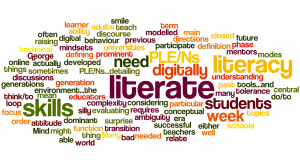
As a university researcher and teacher, I rely heavily on digital tools for my work, including communication, research, and teaching. I consider myself a digital resident when it comes to teaching and research activities, but a digital visitor when it comes to social media.
Digital literacy is a crucial skill for researchers and educators in today’s world. It is the ability to use digital tools and technologies to find, evaluate, create, and communicate information effectively (Belshaw, 2011). However, as we discussed in our group, digital literacy can be a challenge for both teachers and students, with obstacles that must be overcome.
One of the main obstacles to digital literacy is finding the right balance between personal and professional online presence. Social media platforms, for example, can blur the line between personal and professional life, which can be challenging to navigate. Another obstacle is cyber security and copyright issues when it comes to using digital tools for research and teaching. Digital incompetence, resistance to change, assessment instruments, unavailability of enabling policies, and lack of time to effectively incorporate digital resources in teaching are also common obstacles.
Despite the obstacles, digital literacy offers significant opportunities for both teachers and students. For teachers, digital tools offer new ways of engaging students, creating interactive learning environment, and fostering collaboration (Christine Redecker, 2017). As Prensky and St. Clair (2012) suggested educators must adapt their teaching practices to meet the needs of digital natives and incorporate digital tools and technologies into the curriculum. For students, digital literacy provides access to a wealth of information and resources, allows for personalized learning experiences, and prepares them for the digital workforce.
For both teachers and students, staying up-to-date with the latest digital tools and technologies can be difficult, given the rapidly evolving digital landscape. Additionally, cyber security and copyright issues, quality assurance, language barriers, and inequities in access to technology can be a concern when using digital tools for research and teaching. However, ‘thanks to Covid-19 pandemic’, the pace of digital literacy has accelerated in all aspects of our professional and private lives. Though it is a slow process, I recognize the importance of ongoing learning and professional development to benefit from the latest trends and best practices.
From an institutional perspective, the challenge lies in providing teachers and students with the resources and support they need to develop digital literacy skills. Institutions must invest in digital infrastructure, provide training and support, and encourage innovation in the use of digital tools in education. At the same time, institutions must also address issues of security, copyright, and digital incompetency to ensure that all stakeholders are able to participate in the digital world effectively.
In conclusion, in our PBL group we agreed that both the facilitators and participants are not comfortable with our online presence that is increasingly demanding. Though it is a slow process, digital literacy is a crucial skill for researchers and educators in today’s world. While challenges exist, the opportunities for innovation and improved teaching and learning experiences are significant. I believe that ongoing learning and professional development are critical to enhance our digital competency. Additionally, institutions should invest in digital infrastructure, provide training and support, and encourage innovation in the use of digital tools in education to ensure that both teachers and students have the skills they need to succeed in the digital world.
Literature list:
- Belshaw, D. (2011). What is ‘digital literacy’? A Pragmatic investigation. PhD thesis, Durham University. Available at: http://etheses.dur.ac.uk/1876/
- Christine Redecker, 2017. “European Framework for the Digital Competence of Educators: DigCompEdu,” JRC Research Reports JRC107466, Joint Research Centre (Seville site).
- Warschauer, M. (2010). Digital literacy studies: Progress and prospects. Educational Researcher, 39(9), 631- 639.